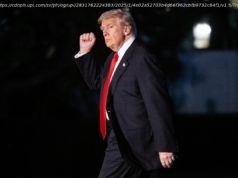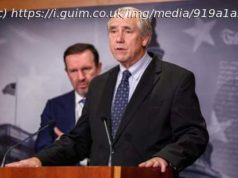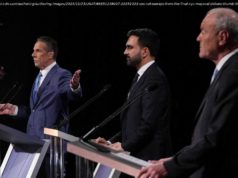The claim puts President Donald Trump in an awkward position, suggesting he possesses vivid evidence of Khashoggi’s premeditated killing, even as he has resisted tough sanctions against the Saudis
WASHINGTON — Turkey said Saturday that it had turned over an audio recording of the killing of a Saudi dissident to the United States and other Western countries, intensifying the pressure on President Donald Trump to take stronger punitive measures against his allies in Saudi Arabia.
The disclosure, made by President Recep Tayyip Erdogan, was his first public acknowledgment of the recording of the killing of the dissident, Jamal Khashoggi, in the Saudi Consulate in Istanbul last month. Saudi Arabia has admitted that its operatives killed Khashoggi but denied that the attack was ordered by Crown Prince Mohammed bin Salman, the kingdom’s de facto ruler and a close ally of Trump.
“We gave them the tapes,” Erdogan said at a news conference in Ankara before flying to Paris to join Trump and other leaders at an international gathering. “They’ve also listened to the conversations, they know it. There is no need to distort this.”
The White House declined to say whether it had a copy of the recording, which Erdogan said Turkey had also provided to Britain, France, Germany and Saudi Arabia. But Erdogan’s claim puts Trump in an awkward position, suggesting he possesses vivid evidence of Khashoggi’s premeditated killing, even as he has resisted tough sanctions against the Saudis and refused to say exactly who he believes was responsible for the crime.
The Trump administration has taken modest steps against the Saudi government, suspending air-refueling flights for its military campaign in Yemen and drafting human rights sanctions against Saudis who have been linked to the killing of Khashoggi, a resident of Virginia who wrote columns for The Washington Post.
But the White House has declined to accuse Crown Prince Mohammed, who has cultivated particularly close ties with Trump’s son-in-law and senior adviser, Jared Kushner, emerging as a linchpin of the administration’s Middle East strategy.
Intelligence officials and senior diplomats have said that any operation like Khashoggi’s assassination almost certainly must be approved by Crown Prince Mohammed, but Turkish officials have said the audio does not itself directly implicate the prince.
The administration’s limited actions against the Saudis seem calculated in part to head off a tougher response in Congress, where lawmakers from both parties have expressed outrage over the killing of a dissident inside a diplomatic compound and Saudi Arabia’s shifting explanations for it.
While Trump said he believes the Saudis tried to cover up the killing, he has steadfastly reserved judgment on who is to blame until the Saudi government provides a definitive public accounting of the episode, based on its own investigation. That is expected this coming week.
“I’ll have a much stronger opinion on that subject over the next week,” Trump said at a news conference Tuesday. “We’re working with Congress, we’re working with Turkey, and we’re working with Saudi Arabia.”
Trump was likely to see Erdogan in Paris, where dozens of world leaders gathered at the invitation of President Emmanuel Macron to mark the 100th anniversary of the end of the First World War.
Turkish and Western officials have previously discussed the existence of the audio recording only on the condition of anonymity. But Turkish officials have said the audio includes clear evidence of a premeditated killing, in which a team of Saudi agents moved quickly and methodically to dismember Khashoggi’s body with a bone saw. It does not include evidence of the reported torture of Khashoggi, these officials said.
CIA Director Gina Haspel met with Turkish intelligence officials in Ankara last month, and Turkish and U. S. officials said she was allowed to listen to the recording but not take a copy with her. It is unclear when or how the Turks shared the recording with the other governments.
Erdogan’s wording suggested he may regard the sharing of the audio with Haspel as the equivalent of handing it over to the U. S.
For the CIA, possessing a physical copy of the tape would be important to verify its authenticity, determine how it was made and analyze its contents independently.
“We don’t comment on intelligence matters,” said the White House press secretary, Sarah Huckabee Sanders.
While the timing and form of the Turkish disclosures are uncertain, Turkey’s motivation for doing so is not. In the weeks since the killing, Erdogan has abandoned his effort to avoid a rupture in Turkey’s relations with Riyadh, and has instead entered into an all-out campaign to damage or even topple Crown Prince Mohammed from power.
At the same time, Erdogan has been careful to praise King Salman, the crown prince’s aging father, in an apparent attempt to appeal to the others in the Saudi royal family who resent his son.
Turkish officials have said Washington is the primary focus of Erdogan’s effort, in part because he believes that only the U. S. has enough influence in Saudi Arabia and the region to punish Crown Prince Mohammed.
On Saturday, Erdogan accused the Saudis of dragging their feet in the investigation. “Saudi Arabia must respond to our good will, and be just, and clear themselves of this stain,” he said.
The hostility between Erdogan and Crown Prince Mohammed is rooted in their diverging ambitions. Erdogan has presented himself as a champion of the Arab Spring uprisings and the Islamist political parties that once appeared poised to ride those revolts to power; Crown Prince Mohammed is the anchor of an alliance of Arab authoritarians who have sought to stamp out those uprisings.
Erdogan was also a personal friend of Khashoggi’s from the writer’s years as a commentator on regional affairs in the Saudi-owned news media.
Still, for weeks after the killing, Erdogan was circumspect, mainly limiting himself to provocative questions. Despite their tensions, the two leaders had kept up the appearance of cordial relations for years because of their shared interests in the region.
Erdogan was also reluctant to acknowledge possession of the audio recording because it appeared to have been obtained through intelligence surveillance inside the Saudi diplomatic compound — something that is routine but also a violation of international diplomatic covenants.
Yet as Saudi Arabia has bungled its response to the killing — denying it for weeks, then calling it an accident, and later acknowledging evidence of premeditation — Erdogan’s posture has hardened.
With criticism mounting, he has evidently calculated that he can deal a serious enough blow to Prince Mohammed to permanently cripple him. When other news in the West threatened to push Khashoggi from the headlines, Turkish allies of Erdogan reached out to Western journalists, pressing for ways to keep it alive.
Домой
United States
USA — Political Turkey’s president says recording of Khashoggi’s killing given to the U. S.






